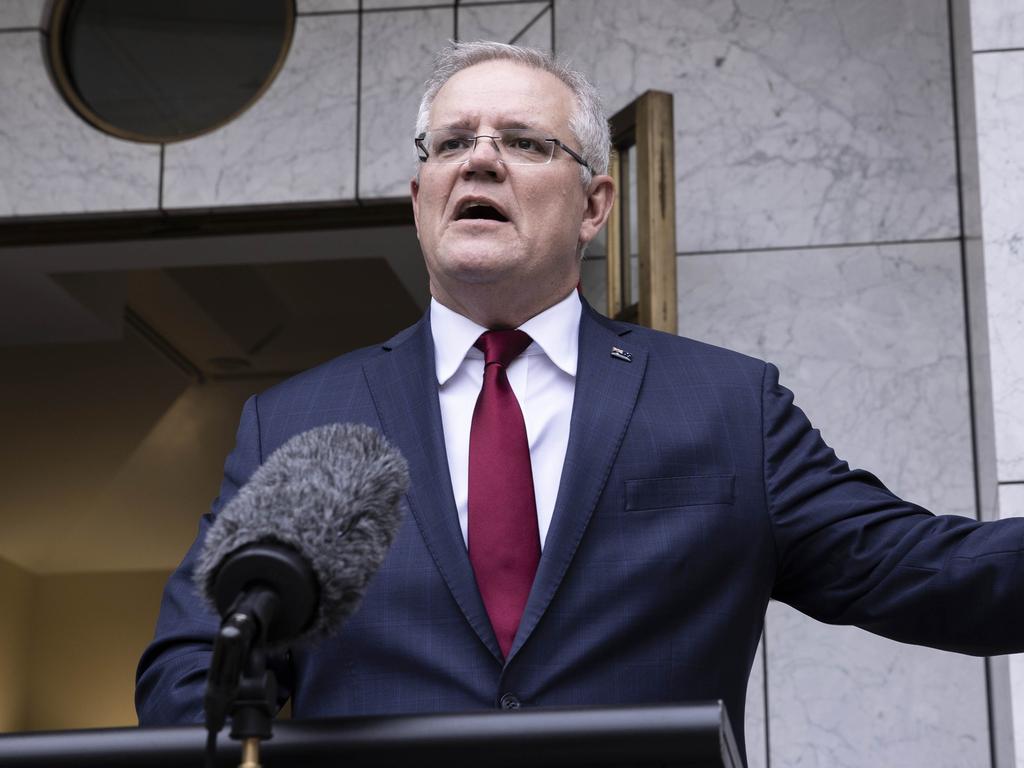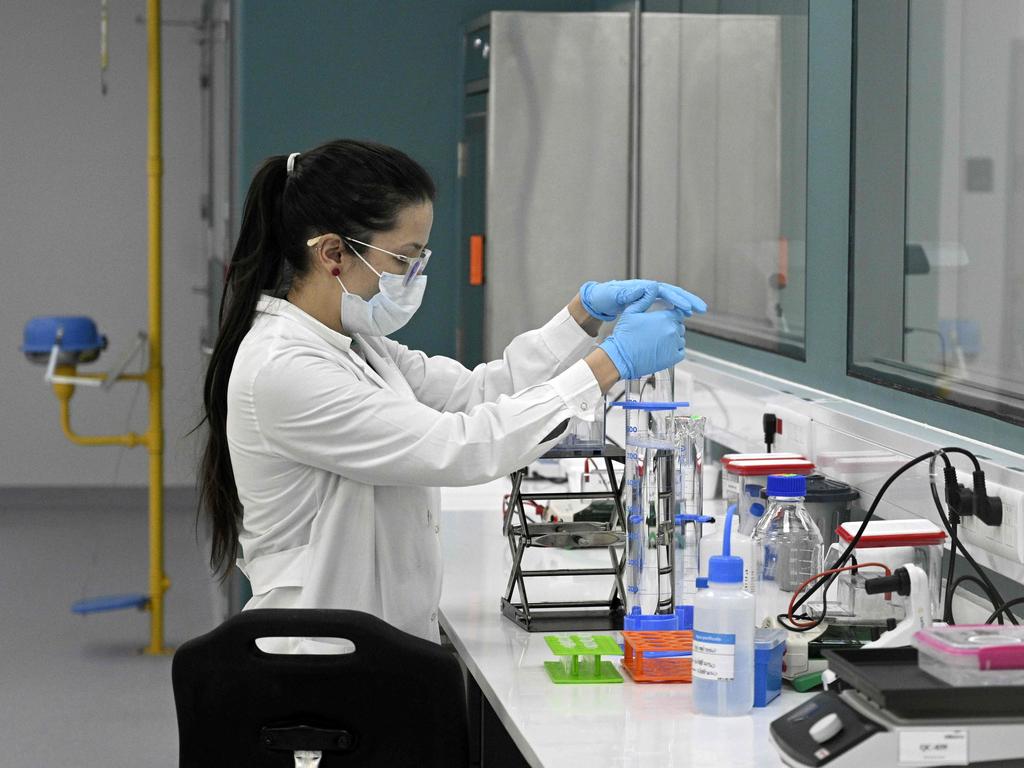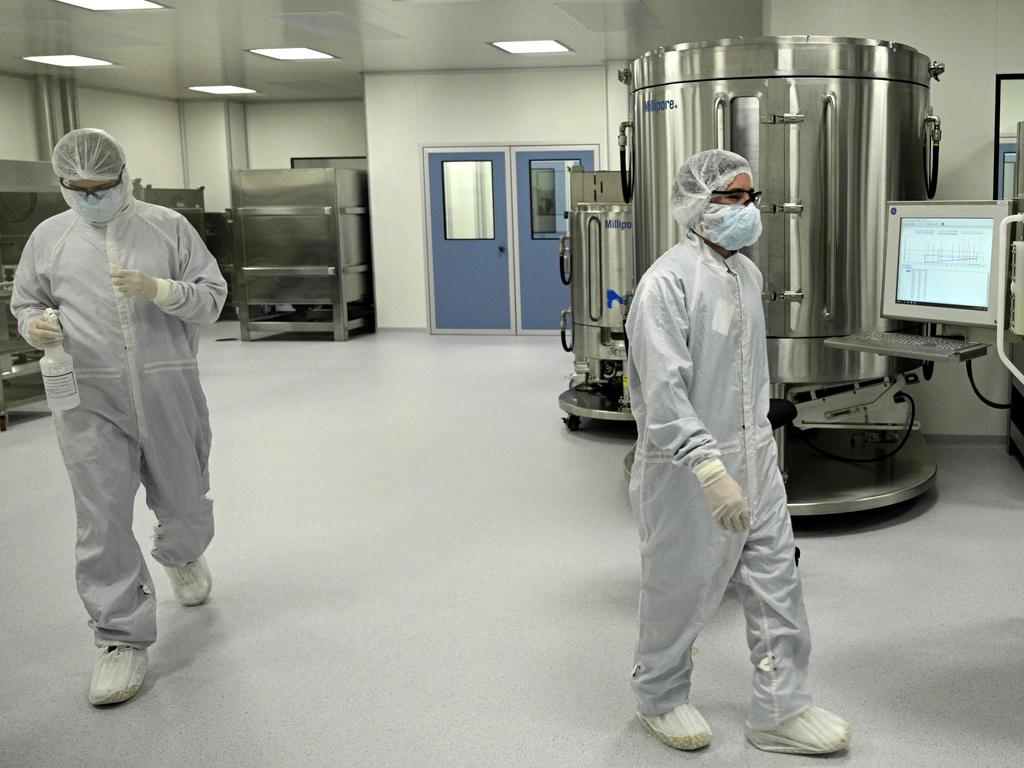Scott Morrison announces free COVID-19 vaccines for Australians, backtracks on ‘mandatory’ comments
Prime Minister Scott Morrison has backtracked on comments that a free COVID-19 vaccine would be ‘as mandatory as possible’ once it’s available.

Prime Minister Scott Morrison has backtracked on his comments that a COVID-19 vaccine will be as “mandatory as you can possibly make it” for all Australians once it becomes available.
News.com.au revealed Wednesday that the Morrison Government confirmed a landmark agreement with drug giant AstraZeneca to manufacture one of the world’s most promising coronavirus vaccines currently being developed by Oxford University researchers.
If it’s proved safe to use, Prime Minister Scott Morrison believes the agreement will ensure Australians will be among the first countries in the world to secure the jab, revealing this morning it could be available to Aussies as soon as early next year.
The UK Government has already ordered 100 million doses.
Asked whether the vaccine would be mandatory, Mr Morrison told 3AW’s Neil Mitchell on Wednesday morning that it needed to get to about 95 per cent of the population.
“I would expect it to be as mandatory as you can possibly make it,” the PM said.
“There are always exemptions for any vaccine on medical grounds but that should be the only basis.
“I mean we’re talking about a pandemic that has destroyed you know, the global economy and taken the lives of hundreds of thousands all around the world and over 450 Australians here.
“We need the most extensive and comprehensive response to this to get Australia back to normal.”
However, he later backtracked on these comments, telling 2GB’s Jim Wilson that the vaccine wouldn’t be compulsory.
“There’s been a bit of an overreaction to any suggestion of this, there will be no compulsory vaccine,” he said on Wednesday afternoon.
“What we want to achieve is as much vaccination as we possibly can.”
It came after Industry, Science and Technology Minister Karen Andrews told 2GB’s Deborah Knight that the Prime Minister had made it clear “we are looking at it being a mandatory vaccine”.
“Basically, there will be medical exemptions that will be considered, but the Prime Minister’s made it clear that we are looking at it being a mandatory vaccine,” Ms Andrews said.
She said issues such as penalties for refusing the vaccine will be considered “in due course”.
While discussing the issue during his earlier 3AW interview, Mr Morrison said a firm decision would be made once the medical issues about the vaccine were known.
Mr Morrison said there “we’ll take that issue when it presents when clinical trials are finished and we have to understand what the medical issues potentially might be … you know, I certainly open to that suggestion but that is not a position that the government has taken”.
Mitchell pointed out that there would be campaigns from the anti-vaxxers but the Prime Minister seemed unfazed.
“I’m used to that, I was the minister that established ‘no jab, no play’,” he said appearing to refer to a policy that sees government benefits withheld from parents who do not vaccinate their children. “My view on this is pretty clear and not for turning.”
During a later press conference, Australia’s acting chief medical officer Professor Paul Kelly said the vaccine would at first, be voluntary.
“Of course, the first will be a voluntary call for people and I’m sure there will be long queues – socially distanced, of course – for this vaccine,” Prof Kelly said.
He said there would be strong campaigns to encourage people “and we’ve had experience before of linking vaccination with other programs and all of those things will be looked at over time”.
While the ‘no jab, no play’ program is aimed at getting children vaccinated, the Prime Minister was asked what the government would do when they were adults.
“We’re going to take this one step at a time,” Mr Morrison told reporters.
“I don’t think offering jelly beans is the way to do that as you do with kids but we’ll take those issues as they present and consider what steps are necessary at that time.”
He said the rollout of the program would also depend on clinical advice that would identify any vulnerabilities in communities.
“The obvious priority is around health workers and people like that,” he said.
The Prime Minister was asked how he would make any vaccine mandatory.
“This is like any vaccine and, as you know, I have a pretty strong view on vaccines, being the Social Services Minister that introduced ‘no jab, no play’,” he said.
RELATED: Follow the latest coronavirus updates

RELATED: How the Oxford vaccine works
“What is important to understand with any of these vaccines is it does protect you … but it also protects the community and, as is the case with any vaccine, there will be some individuals who, for precise medical reasons, can have issues with any vaccine,” Mr Morrison said.
“They and their safety and their health depends on the vaccine’s take-up more broadly in the community. That’s how they get protected.
“And this is an important part of our vaccine strategy, not just on Covid-19, but more broadly. We’ll seek its most widespread application, as we do with all important vaccines.”
A vaccine holds the key to life returning to normal for millions of Australians and the hope that international travel can resume in the future after the nation’s borders were closed earlier this year.
While Mr Morrison cautioned that more work needed to be done to prove the vaccine was safe to use, he told news.com.au the government will fund the rollout of more than 25 million doses to cover every Australian as soon as the drug is available which could be next year.
“The Oxford vaccine is one of the most advanced and promising in the world, and under this deal we have secured early access for every Australian,” Mr Morrison said.
“If this vaccine proves successful we will manufacture and supply vaccines straight away under our own steam and make it free for 25 million Australians.
“However there is no guarantee that this, or any other, vaccine will be successful, which is why we are continuing our discussions with many parties around the world while backing our own researchers at the same time to find a vaccine.
RELATED: Cases not falling as steeply as expected

In a “Letter of Intent” with drug company AstraZeneca to supply the University of Oxford’s COVID-19 vaccine candidate to Australia, medical manufacturer Becton Dickinson has also been engaged for the supply of millions of needles and syringes.
The Letter of Intent covers vaccine development, production in Australia and distribution with a formal agreement including the price of the vaccine to taxpayers to follow.
However it will be provided to all Australians free of charge.
Mr Morrison said he was also working to ensure early access to the vaccine was secured “for countries in our Pacific family, as well as regional partners in Southeast Asia.”
HOW THE VACCINE WORKS
The Oxford University vaccine is made from a genetically engineered virus that causes the common cold in chimpanzees and is known as ChAdOx1 nCoV-19.
Scientists have altered the virus to make it mimic the coronavirus and ensure the immune system can learn how to attack it. It does not involve injecting COVID-19 but a virus that “looks like” the virus to trigger an immune response.
Recent trials involving 1,077 people showed promising signs that it can trigger an immune response but further trials are underway.
“The preliminary data shows that it is safe and induces a strong antibody response in all vaccinated volunteers, suggesting that an effective vaccine could be within reach,” Oxford University’s Rebecca Ashfield said in July.
“This trial was the first time that the vaccine had been given to humans: 543 healthy adults aged 18-55 were vaccinated with a single dose of ChAdOx1 nCoV-19. A further 534 people were given a control vaccine that gives similar minor reactions, including injection site redness and mild pain.
“Volunteers are having their immune response (both antibodies and T cell levels) monitored for at least 12 months, and will also be observed to see whether or not they develop COVID-19.
“The preliminary data from the trial clearly demonstrates that the vaccine induces an antibody response within 28 days. This response is in a similar range to that in individuals who have recovered from COVID-19, providing encouragement that the vaccine will be able to protect the majority of people against infection.
During the trials, ten volunteers were also given a second “booster” dose of the vaccine which increased the antibody response to even higher levels.
“Importantly, the vaccine demonstrates an acceptable safety profile, with no vaccine-induced severe adverse events – that is, no major side-effects,” Dr Ashfield said.
BUT ANNUAL ‘BOOSTER’ SHOTS MAY BE REQUIRED
Scientists working on the vaccine believe that one dose may not be enough to protect against COVID-19 infections.
“My personal prediction — based on decreases in antibody levels in individuals infected with other types of coronavirus, rather than data from the current vaccine trial — is that we’re likely to need yearly boosters, similar to annual flu jabs,’’ Dr Ashfield said.
Deliberately infecting people with the virus may be possible in future (after careful consideration of the ethical implications), but is not currently allowed.
A second trial has been launched involving 10,000 UK individuals, focusing on health workers and other trials are being conducted around the world, including in Brazil where rates of infection are high.
“The expanded UK trial will include children and older adults to estimate vaccine efficacy in these age groups. Immune responses in people over 70 are often lower than those in younger adults,’’ she said.

HUNDREDS OF VOLUNTEERS SOUGHT FOR VACCINE TRIALS IN THE UK AND SOUTH AMERICA
More than 100,000 people have already signed up to take part in trials of COVID-19 vaccines.
It follows earlier trials with mice and rhesus macaque monkeys.
“Significantly, the vaccinated monkeys were protected from severe disease after they were challenged with a much higher dose of SARS-CoV-2 than humans would encounter through natural exposure,’’ Dr Ashfield said.
The volunteers in the current trials will be given a placebo dose or the vaccine and then be asked to visit a hospital, or other research site to test their response over the next six months.
COVID-19 JABS TO BE MANUFACTURED IN AUSTRALIA
Some of Australia’s most experienced scientists and pharmaceutical experts have been brought together to provide advice on acquiring safe and effective COVID-19 vaccinations.
The COVID-19 Vaccines and Treatments for Australia Science and Industry Technical Advisory Group held its first meeting this week with Professor Brendan Murphy, Secretary of the Department of Health, leading the group.
On Sunday, Health Minister Greg Hunt confirmed he was in the final stages of negotiations with a manufacturer to produce the drug with AstraZeneca.
“From early on Australian officials led by my department has been meeting with developers and manufacturers of a number of promising vaccine candidates, both domestic and international, over recent months,’’ he told news.com.au.
“We are confident these actions and targeted investments will put us in the best possible position to secure early access to safe and effective vaccines for Australia.”
In April the University of Oxford announced its partnership with AstraZeneca that will see the organisations work with “global partners” to ensure the vaccine is available around the world, particularly for low and middle income countries.
Both the university and the pharmaceutical giant are working on a not-for-profit basis during the course of the pandemic.
“Any royalties the university subsequently receives from the vaccine will be reinvested directly back into medical research, including a new Pandemic Preparedness and Vaccine Research Centre. The centre is being developed in collaboration with AstraZeneca,” Oxford University has said.



